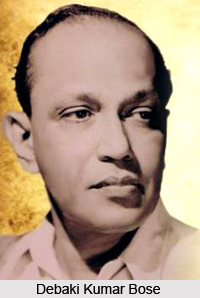 Debaki Kumar Bose, was a top most director, writer, actor of Indian Cinema of pre independence time. He was born on 25 November 1898 in Burdwan (West Bengal). He was son of a successful advocate in Burdwan. He was inspired from Mahatma Gandhi`s famous Non Cooperation Movement. Then he walked out of examination and started living on his own in a simple way. There he opened a shop in local market selling towels. On the other hand, he was also an editor of a local weekly named "Shakti". Dhiren Ganguly, an established film director from Calcutta, visited Burdwan at that time. There he met Debaki and as he came know about his writing skills. Then he invited Debaki to come to Kolkata to write film scripts for his production. This culminated into the first film made by British Dominion Films named Kamonar Agun. From that Debaki Kumar Bose became the famous in Bengali Cinema industry. During that period, many of the Bengali films made by him were also released in Hindi and even in Marathi and Tamil languages.
Debaki Kumar Bose, was a top most director, writer, actor of Indian Cinema of pre independence time. He was born on 25 November 1898 in Burdwan (West Bengal). He was son of a successful advocate in Burdwan. He was inspired from Mahatma Gandhi`s famous Non Cooperation Movement. Then he walked out of examination and started living on his own in a simple way. There he opened a shop in local market selling towels. On the other hand, he was also an editor of a local weekly named "Shakti". Dhiren Ganguly, an established film director from Calcutta, visited Burdwan at that time. There he met Debaki and as he came know about his writing skills. Then he invited Debaki to come to Kolkata to write film scripts for his production. This culminated into the first film made by British Dominion Films named Kamonar Agun. From that Debaki Kumar Bose became the famous in Bengali Cinema industry. During that period, many of the Bengali films made by him were also released in Hindi and even in Marathi and Tamil languages.
Debaki Kumar Bose was widely known for his innovative use of sound and music in Indian Cinema. In his early days he worked under the banner of British Dominion Films of Dhiren Ganguly. Later he worked with Pramathesh Barua`s Barua Pictures. After that he finally joined under the falg ship of New Theatres in 1932. He started successfully his own production company, Debaki Productions, in 1945. Debaki Bose received Padma Shri in Arts in 1958.
His major works are: Chandidas(1932) was directed by him. It contained background music that was the first in Indian Cinema. The music director was Rai chand Boral. Seeta (1934) was made under the banner of East India Film Company. It was the first Indian talkie shown in any International film festival. It was shown in Venice Film Festival. He was also the first Indian director to receive any International Award. After independence, Debaki Bose released Sagar Sangamey in 1959. It was nominated for Golden Bear at the 9th Berlin International Film Festival. This film got National Film Award for Best Feature Film in 1959. Later he released Arghya in 1961. It was a very special documentary film, produced by the Government of West Bengal at that time on the occasion of Rabindranath Tagore`s birthday.
Debaki Bose had directed the following films:
| Panchasar (1930) | Seeta (1934) | Shri Ramanuja (1943) | Pathik (1953) |
| Shadows of the Dead (1931) | Jeevan Natak (1935) | Swarg Se Sundar Desh Hamara (1945) | Kavi (1954) |
| Aparadhi (1931) | Inquilab (1935) | Meghdoot (1945) | Bhagaban Shrikrishna Chaitanya (1954) |
| Nishir Dak (1932) | Sonar Sansar (1936) | Krishna Leela (1946) | Bhalobasa (1955) |
| Chandidas (1932) | Bidyapati (1937) | Alakananda (1947) | Nabajanma (1956) |
| Rajrani Meera (1933) | Sapera (1939) | Chandrashekhar (1947) | Chirakumar Sabha (1956) |
| Puran Bhagat (1933) | Nartaki (1940) | Sir Sankarnath (1948) | Sonar Kathi (1958) |
| Meerabai (1933) | Abhinava (1940) | Kavi (1949) | Sagar Sangamey (1959) |
| Dulari Bibi (1933) | Apna Ghar (1942) | Ratnadeep (1951) | Arghya (1961) |






